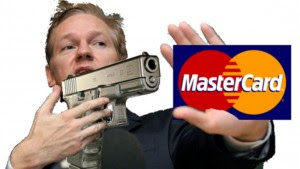Merria
 m Associates reports: "It was just a matter of time before the kinds of people who vandalized brand symbols at world economic summits resorted to brand cyber-vandalism. The Wikileaks hacktivists have targeted and threatened global brands like Mastercard, Visa, Paypal, Amazon, Twitter and Shell. Because of their symbolic power, brands are regularly co-opted to attract attention and dramatize political issues. That is how The Gap has become a symbol for sweatshops, McDonald's for the obesity epidemic, Walmart for labor violations and on and on. Many brands are more powerful than sovereign nations. Of the 100 largest economies in the world, 51 are corporations, not nations."
m Associates reports: "It was just a matter of time before the kinds of people who vandalized brand symbols at world economic summits resorted to brand cyber-vandalism. The Wikileaks hacktivists have targeted and threatened global brands like Mastercard, Visa, Paypal, Amazon, Twitter and Shell. Because of their symbolic power, brands are regularly co-opted to attract attention and dramatize political issues. That is how The Gap has become a symbol for sweatshops, McDonald's for the obesity epidemic, Walmart for labor violations and on and on. Many brands are more powerful than sovereign nations. Of the 100 largest economies in the world, 51 are corporations, not nations."My first attended discussion at the Vietnam Digital Marketing and Technology Conference was a really fast talking guy from Singapore who gave a very convincing presentation on how, over the last year, Nike won and Accenture lost by their corporate behaviour regarding Tiger Woods*. In terms of public sentiment only, Nike won favour by standing by Tiger Woods and Accenture (those lovely folks who used to be Arthur Anderson) lost. People all over the world vote with their wallet (or credit card) every day. Last year the gay website Fabulis, had their account frozen by CitiBank when a mid-level manager thought the website contained "objectionable content". It did not, unless of course, you are homophobic. "When telephone calls, emails and meetings failed to resolve the situation, Fabulis site owner Jason Goldberg started an online attack, blogging snippets of bank conversations and virally sharing their stonewalling decisions. Just twenty-four hours after Goldberg’s blog campaign began, Citibank recanted, issuing an email apology to Goldberg. Having created an online PR disaster for the bank, Jason then took his business and $625,000 account elsewhere.", reports Business Spectator.
Hacktivism, while mainly associated with the WikiLeaks story currently, can now be practiced by anyone with a computer, an opinion and a few others who agree with them - and all brands should very much be aware of that. I've coined it Detri-Viral marketing. Of course, the best defense is a pro-active offense. More on that here.
* BTW: As a man in China is perceived to be more powerful depending on the number of mistresses he maintains, Tiger's rep in China (Nike's biggest future market) went up, not down.
For more on digital marketing and social networking see:
Xing vs. LinkedIn: Round II
Trial and Error: The New Normal
What's Wrong With My Social Networking? Xing vs. LinkedIn I
Low Tech Germany. Who Knew?
Advertising People and Blogs
How to Write the Best Blog in the World
What If Gutenberg Had a Blog?
If Blogs Are Free Does That Make Them Worthless?
Detri-Viral Marketing II: The Top 10 Social Media Blunders
Bright Lights, Big Internet and the WWED
Saigon Digital Marketing Conference Successfully Avoids Plumbers Convention
A Tale of Many Marketing Conferences
Detri-Viral Marketing I: How Web 2.0 Can Go Against A Brand
Marketing Predictions for 2009
Barcamp Saigon 2008
"Ignore Everybody" is Born: A Plug for Hugh MacLeod
Are the Bloggerati Missing the Market? Asia has Risen,
Into the Gapinvoid - Web 2.0 Social Networking Born 20 Years Ago
Very interesting David. The influence of the internet and spreading news -not everybody is waiting for- will transform the planet. Hacktivism looks like acts with a form of extremism (thats what some people involved want to believe us) but in future companies and brands have to be more open then ever regarding what -and how they- produce. Openess is the kea to change things. No hidden power blocks manipulating the crowd.
ReplyDelete